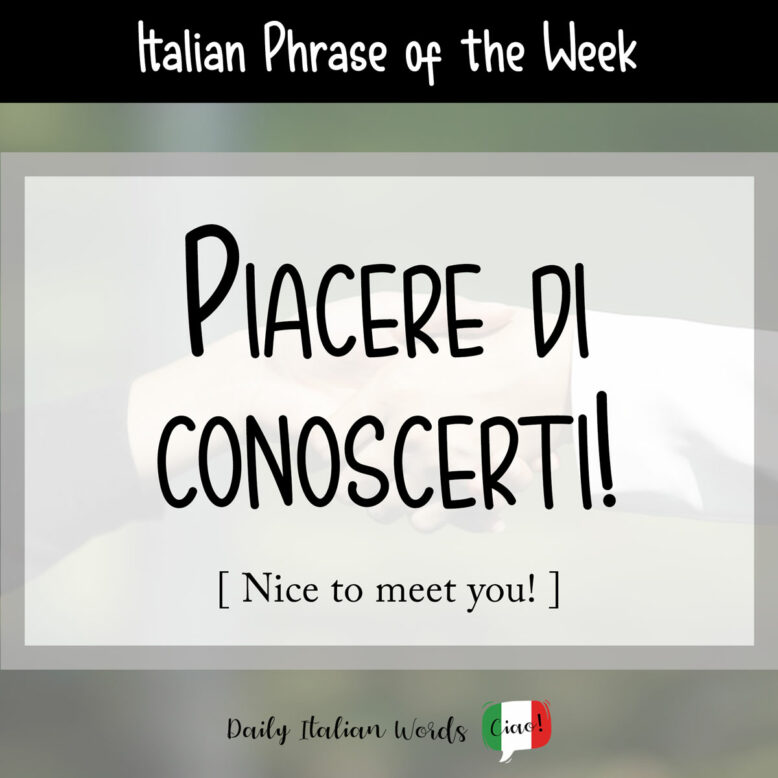After mastering the basic introductions, one of the first phrases worth learning in any language is “Nice to meet you.” Let’s take a look at how to translate this phrase into Italian.
Piacere di conoscerti.
Nice to meet you.

Piacere is both a noun and a verb in Italian. When used as a verb, it usually translates as “to like” (or literally “to please“). For example:
Ho qualcosa che ti potrebbe piacere.
I have something you might like.
(literally “I have something that might please you”)
As a noun, it has a slightly broader meaning. It can mean pleasure or favour depending on the context. For example:
Mi fa piacere rivederti.
I’m happy to see you again.
(literally “It gives me pleasure to see you again”)
Mi fai un piacere?
Would you do me a favour?
As you might have guessed, in the phrase piacere di conoscerti, piacere assumes the former meaning of pleasure. It literally means “pleasure to know you“.
Appended to the end of the verb conoscere (to know) is the informal ti (you). Due to this, this phrase is best suited for use with individuals of similar age, like a friend of a friend or your sibling’s new romantic partner. It’s advisable to avoid using it with older people or in formal settings, such as the workplace.

Italians are also known for keeping things short and sweet, so don’t be surprised if your new Italian friends abbreviate Piacere di conoscerti to just Piacere or Molto piacere (literally “much pleasure”).
Ciao, sono Gianni. – Piacere, io sono Carlo.
Hi, I’m Gianni. – Nice to meet you, I’m Carlo.
In response to this, you can expect to hear Il piacere è tutto mio (“the pleasure is all mine”) or simply Piacere mio (literally “my pleasure”).

So, what if you want to say “Nice to meet you” to someone in a formal setting? Simply replace ti with the formal la (you).
Piacere di conoscerla.
Nice to meet you.
An alternative way to word this phrase is:
Piacere di fare la sua conoscenza.
Nice to make your acquaintance.
Note: You may see la and sua written with a capital letter: La / Sua. Both forms are correct, although La / Sua tend to be employed predominantly in very formal writing.
Even more formally, you might encounter the following expression. Lieto/a literally means happy, content or glad.
Lieto di conoscerla.
Nice to meet you.
Heather Broster is a graduate with honours in linguistics from the University of Western Ontario. She is an aspiring polyglot, proficient in English and Italian, as well as Japanese, Welsh, and French to varying degrees of fluency. Originally from Toronto, Heather has resided in various countries, notably Italy for a period of six years. Her primary focus lies in the fields of language acquisition, education, and bilingual instruction.


